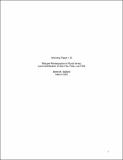| dc.contributor.author | Ballard, Brett M. | |
| dc.date.accessioned | 2015-07-01T16:31:57Z | |
| dc.date.available | 2015-07-01T16:31:57Z | |
| dc.date.issued | 2003-03 | |
| dc.identifier.uri | http://hdl.handle.net/1721.1/97609 | |
| dc.description.abstract | The successful reintegration of refugee groups in rural areas often depends on people’s access to and control over productive land resources. The acquisition of land and the preservation of secure use rights depend on people’s ability to invest household labour and capital resources to intensify agricultural production. For the Hmong of Ban Pha Thao in Laos, people with social and political capital, as well as financial assets, were able to acquire and invest in better quality land following the introduction of an irrigation scheme. The unequal distribution of land has resulted in a rapid re-articulation of the village social structure, in which some people in the community have been able to re-integrate more successfully than others. Policy makers and planners must ask themselves if such outcomes are desirable in terms of how they envision "successful reintegration." | en_US |
| dc.language.iso | en_US | en_US |
| dc.publisher | Inter-University Committee on International Migration | en_US |
| dc.relation.ispartofseries | Rosemarie Rogers Working Paper Series;18 | |
| dc.title | Refugee Reintegration in Rural Areas: Land Distribution in Ban Pha Thao, Lao PDR | en_US |
| dc.type | Working Paper | en_US |
